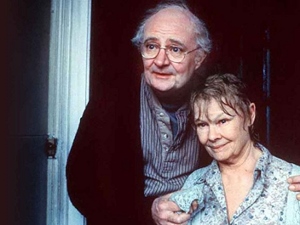[6]
Judi Dench and Jim Broadbent star in this true but tragic love story about lovers of 40 years who are torn apart by Alzheimer’s Disease. Dench is portraying novelist Iris Murdoch, a lover of language who begins losing her ability to communicate, becoming more and more lost in her own inner world. Broadbent plays her devoted husband, desperately trying to understand her and keep her involved in the world around them. Co-writer/director Richard Eyre (Notes on a Scandal, Stage Beauty) constantly shuffles the past with the present, allowing us to catch a glimpse of the relationship at stake — how they met, the hurdles they’ve conquered, and the joys they’ve shared. Kate Winslet and Hugh Bonneville play the lovers in their college years.
There’s nothing surprising here. The performances are all as good as you’d expect from such a grade-A cast. We’re reminded throughout the film by a doctor character that the disease will defeat Iris, and since it’s a true story, I don’t think I’m spoiling anything to say that, indeed, it does. If this were a work of fiction, I’d wish there were a subplot woven through the film to give it extra meaning or resonance, but Iris is decidedly a claustrophobic character piece. I found it most interesting when it allowed us to examine Iris without other characters intervening. There’s a scene at the beach, for instance, where Iris tears blank pages out of a notebook and lays them around her, placing a stone atop each sheet so that it doesn’t blow away. What does that mean? I don’t know, but it’s an engaging clue that gives us, the audience, an opportunity to try understanding her ourselves.
Since Iris can’t speak for most of the film, composer James Horner does a lot of the speaking for her. At times the music pushes Iris into sappiness, but overall it works to remind us that the movie is a love story, despite the clouds on the horizon.
Academy Award: Best Supporting Actor (Jim Broadbent)
Nominations: Best Actress (Judi Dench), Supporting Actress (Kate Winslet)


